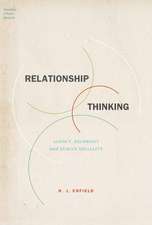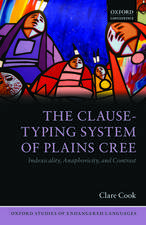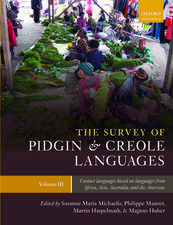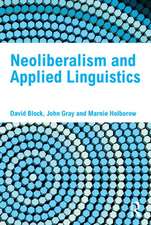Social Class in Applied Linguistics
Autor David Blocken Limba Engleză Hardback – 18 noi 2013
Traditionally, research on language and identity has focused on aspects such as race, ethnicity, nationality, gender, religion and sexuality. Political economy, and social class, as an identity inscription, have been undervalued. This book argues that increasing socioeconomic inequality, which has come with the consolidation of neoliberal policies and practices worldwide, requires changes in how we think about identity and proposes that social class should be brought to the fore as a key construct.
Social Class in Applied Linguistics begins with an in-depth theoretical discussion of social class before considering the extent to which social class has been a key construct in three general areas of applied linguistics- sociolinguistics, bi/multilingualism and second language acquisition and learning research. Throughout the book, Block suggests ways in which social class might be incorporated into future applied linguistics research.
A critical read for postgraduate students and researchers in the areas of applied linguistics, language education and TESOL.
| Toate formatele și edițiile | Preț | Express |
|---|---|---|
| Paperback (1) | 446.53 lei 6-8 săpt. | |
| Taylor & Francis – 18 noi 2013 | 446.53 lei 6-8 săpt. | |
| Hardback (1) | 1218.08 lei 6-8 săpt. | |
| Taylor & Francis – 18 noi 2013 | 1218.08 lei 6-8 săpt. |
Preț: 1218.08 lei
Preț vechi: 1485.47 lei
-18% Nou
Puncte Express: 1827
Preț estimativ în valută:
233.11€ • 253.12$ • 195.81£
233.11€ • 253.12$ • 195.81£
Carte tipărită la comandă
Livrare economică 22 aprilie-06 mai
Preluare comenzi: 021 569.72.76
Specificații
ISBN-13: 9780415548175
ISBN-10: 0415548179
Pagini: 224
Ilustrații: 8 tables
Dimensiuni: 156 x 234 x 18 mm
Greutate: 0.45 kg
Ediția:New.
Editura: Taylor & Francis
Colecția Routledge
Locul publicării:Oxford, United Kingdom
ISBN-10: 0415548179
Pagini: 224
Ilustrații: 8 tables
Dimensiuni: 156 x 234 x 18 mm
Greutate: 0.45 kg
Ediția:New.
Editura: Taylor & Francis
Colecția Routledge
Locul publicării:Oxford, United Kingdom
Cuprins
Prologue.1. Setting the Stage 2. What is Social Class? 3. Social Class in Sociolinguistics 4. Social Class in Bilingualism Research 5. Social Class in Second Language Acquisition and Learning. Epilogue
Notă biografică
David Block is Research Professor in Sociolinguistics for the Institució Catalana de Recerca i Estudis Avançats (ICREA) and works in the Department d’Anglès i Lingüística at the Universitat de Lleida, Spain. He is co-author of Neoliberalism and Applied Linguistics (Routledge, 2012).
Recenzii
'Social class has finally emerged from the shadows in the field of applied linguistics. There is no scholar better qualified than David Block to undertake a rigorous examination of this important and complex topic. Social Class in Applied Linguistics is groundbreaking.' - Bonny Norton, Professor and Distinguished University Scholar, University of British Columbia, Canada
'This is a fascinating, sometimes provocative, and often innovative book, which brings together concepts and ideas that have been begging to be discussed in their interconnection for a very long while. For far too long applied linguists have referred to social class or paid lip service to its importance in their fields of research, but a full and insightful attempt to bring these ideas together has been lacking. It is the 'erasure' that Block refers to in his book, and which he sets out very carefully to put right. This is a timely book as indeed many in these related research areas are increasingly bringing aspects of social class to their analyses. This book will provide a scholarly and stimulating set of building blocks from which to develop the discussions'. - Clare Mar-Molinero, University of Southampton, UK
'...Block’s book is a real milestone, and the reflections presented here will hopefully prompt further detailed discussion of social class in applied linguistics.' - Chiara Meluzzi, Free University of Bozen-Bolzano
'This is a fascinating, sometimes provocative, and often innovative book, which brings together concepts and ideas that have been begging to be discussed in their interconnection for a very long while. For far too long applied linguists have referred to social class or paid lip service to its importance in their fields of research, but a full and insightful attempt to bring these ideas together has been lacking. It is the 'erasure' that Block refers to in his book, and which he sets out very carefully to put right. This is a timely book as indeed many in these related research areas are increasingly bringing aspects of social class to their analyses. This book will provide a scholarly and stimulating set of building blocks from which to develop the discussions'. - Clare Mar-Molinero, University of Southampton, UK
'...Block’s book is a real milestone, and the reflections presented here will hopefully prompt further detailed discussion of social class in applied linguistics.' - Chiara Meluzzi, Free University of Bozen-Bolzano
Descriere
Publications on language and identity generally focus on global language and culture flows, and are seldom informed by political economy. Additionally, social class, as an identity inscription, is ignored. This book argues that the increasing socioeconomic inequality, which has come with the consolidation of neoliberal policies and practices worldwide, requires changes in how we think about identity.





















